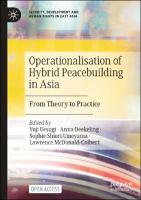Operationalisation of Hybrid Peacebuilding in Asia
From Theory to Practice
Contributor(s)
Uesugi, Yuji (editor)
Deekeling, Anna (editor)
Umeyama, Sophie Shiori (editor)
McDonald-Colbert, Lawrence (editor)
Language
EnglishAbstract
This open access book explores common critiques in the literature of hybrid peacebuilding, especially the lack of connection between hybridity in theory and practice. Through using a complexity-informed framework, the foundation for introducing the mid-space actor typology is established. Mid-space actors as insider-partial mediators are perceived to be vital agents for peace processes in conflict-affected areas and thus can be important power brokers and focal points for outside actors. In this book, two insider views are examined through analysing mid-space actors in the peacebuilding process in Cambodia and in Mindanao, the Philippines. First, it explores the process of identity-building of Cambodian monks and how such a process enables or hinders the monks to bridge existing cleavages. Then, in the case study of Mindanao, the roles of civil society actors are considered. The next step is to introduce the outsider’s perspective on hybrid peacebuilding and how Asian peacebuilding actors such as China and Japan are engaging with mid-space actors who provide key bridges in peacebuilding.
Keywords
Asian Politics; International Relations; Peace and Conflict Studies; Peacebuilding; Hybridity; Mid-space Actors; Hybrid Peacebuilding in Asia; Adaptive Peacebuilding; Developmental Peacebuilding; Hybrid Peace; Open Access; Politics & government; AsiaDOI
10.1007/978-3-030-67758-9ISBN
9783030677589, 9783030677589Publisher
Springer NaturePublisher website
https://www.springernature.com/gp/products/booksPublication date and place
2021Imprint
Palgrave MacmillanSeries
Security, Development and Human Rights in East Asia,Classification
Politics and government
International relations


 Download
Download Web Shop
Web Shop